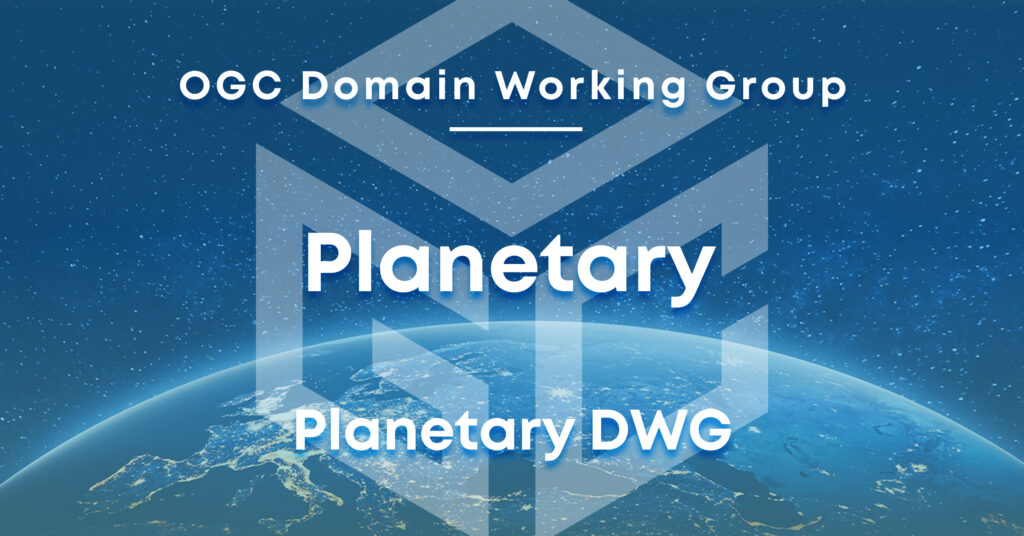OGC announces Christy Monaco as new Chief Operating Officer
As OGC’s COO, Christy will use her experience with federal agencies, partnership-building, event management, and member success to help grow and shape the Consortium.

The objective of the Planetary DWG is to identify requirements to revise or extend OGC standards for celestial bodies other than the Earth.
The Planetary Domain Working Group (DWG) continually updates and aligns OGC standards with evolving scientific requirements for celestial bodies as determined by the planetary science community. This includes ensuring that these standards are relevant and applicable to the study and exploration of planets, satellites, asteroids, Sun, comets, and other celestial bodies within our solar system that can be spatially resolved to have a disk or surface. Celestial entities that cannot be spatially resolved in such a manner, including exoplanets, fall outside the scope of this working group’s activities.
The study of planetary bodies through direct optical and spectral observations of their surfaces is pivotal for understanding their evolution over geological time, internal dynamics, and climatic changes for those with atmospheres. These planetary surfaces are archives of the key stages in the evolution of our Solar System, necessitating a holistic approach to data analysis. To facilitate effective study, it is imperative to amalgamate all available data by geographical area, which may include information from the same mission at different times or data from various instruments across multiple missions. This necessitates the co-registration and georeferencing of data to enable efficient analysis across spatial scales, from global to local. Geographic Information Systems (GIS) or other spatially aware software tools are commonly employed by practitioners to merge data, visualize it, and conduct analyses that exploit its spatial attributes. However, planetary data, sourced from repositories worldwide and typically hosted by Space Agencies or mission teams, highlight the critical need for interoperability among these diverse archives.
Addressing the challenges of applying OGC mapping standards within planetary science reveals several problems, primarily due to the standards’ historical development for Earth observation. The need to define a common coordinate reference system (CRS) for combining data from various repositories has led to issues with the identifiers and definitions of celestial body data projections. The dynamic nature of spatial reference systems for celestial bodies, as updated every three years by the IAU, necessitates the versioning and visibility of these identifiers in a global registry. Moreover, to accommodate the characteristics of the IAU CRS, updates to the WKT-CRS standard are essential, alongside modifications to all OGC standards dependent on it. Furthermore, the visualization of in-situ data, such as that acquired by rovers, and the integration of telescopic images into OGC standards, presents unique challenges in data visualization and discovery. Addressing these issues, alongside enhancing the value provided by planetary data archives, underscores the comprehensive role of the Planetary DWG in refining and advancing OGC standards to meet the nuanced needs of planetary science research.
The Planetary Domain Working Group (DWG) is engaged in a series of key activities aimed at enhancing the handling, processing, and publishing of spatial planetary data within the context of geospatial technology. These activities include sharing information and experiences regarding tools and methodologies for managing georeferenced planetary data, and proposing improvements to better accommodate these data types in GIS platforms. The DWG also takes the lead in conceptualizing, designing, coordinating, and implementing a range of projects—from demonstrations and pilots to production projects—that showcase technical solutions to challenges associated with planetary spatial data, leveraging the existing mechanisms and extension capabilities of OGC spatial data service standards. Furthermore, the group is dedicated to gathering and evaluating information on planetary spatial data challenges, successful technical solutions, and best practices. When deemed appropriate, this information is presented to the OGC Technical Committee (TC) or its Standards Working Groups to initiate further actions or developments. In addition to developing and promoting best practices for processing and publishing planetary data, the DWG manages a mailing list that serves as a forum for discussing domain-relevant issues, fostering a collaborative environment for problem-solving and innovation within the OGC community.
The Planetary DWG will work closely with other OGC Working Groups such as the Coordinate Reference System SWG and the OGC API SWGs. They also work with the International Astronomical Union working group on Cartographic Coordinates and Rotational Elements, the Planetary Data System, International Planetary Data Alliance (IPDA7), US Geological Survey (USGS), National Aeronautics and Space Administration (NASA), European Space Agency (ESA), and Japan Aerospace Exploration Agency (JAXA).
Working Group Chairs: Trent Hare (US Geological Survey (USGS), Jean-Christophe Malapert (CNES)
Receive the latest news on OGC.
© 2024 Open Geospatial Consortium. All Rights Reserved.